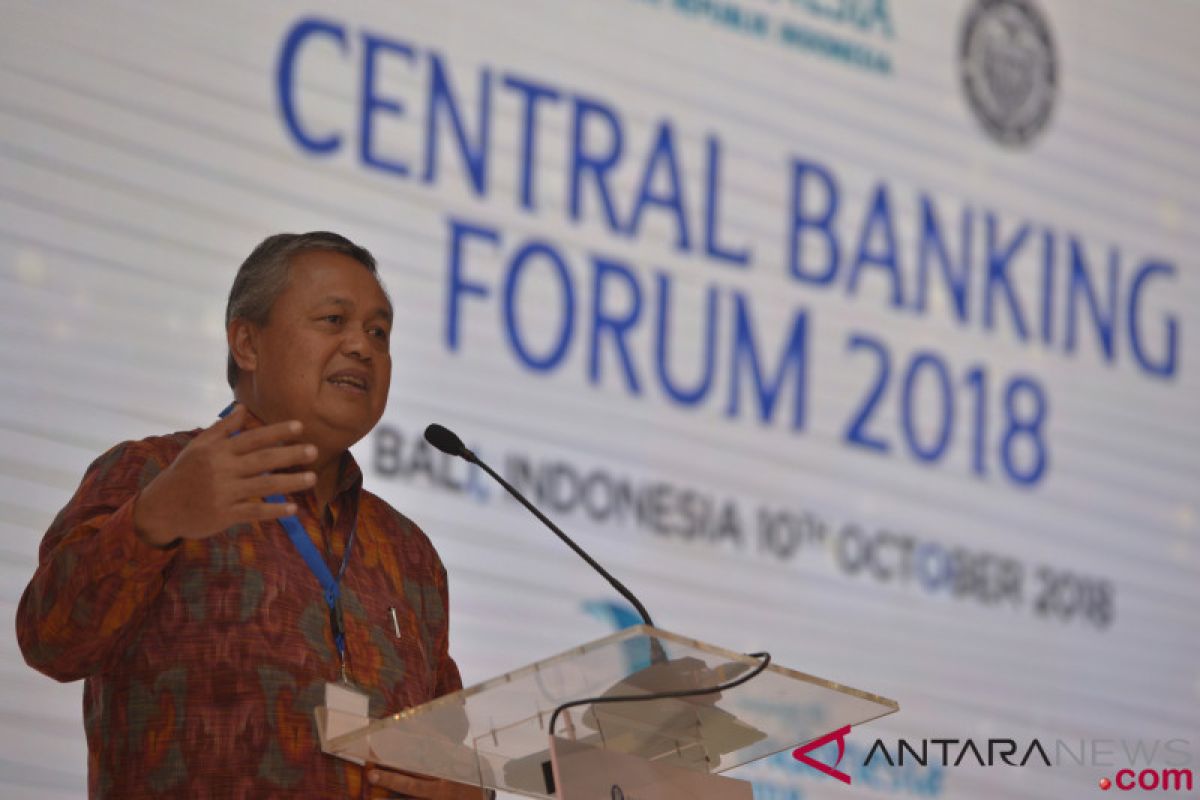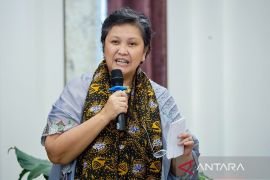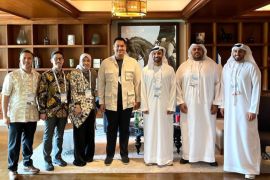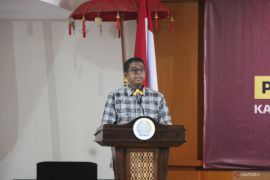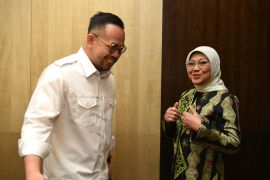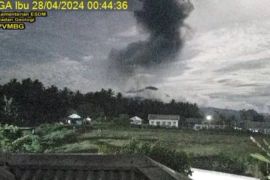Solid economic gains achieved in the United States throughout 2018 will be restrained by consolidation in 2019. Nevertheless, inflation expectations in the United States remain high, and analysts expect the US Federal Reserve to continue raising its policy rate.
In Europe, economic growth tends to slowdown amid inflation hike trend. The current monetary policy normalization in Europe, done by reducing purchase of financial assets, is expected to continue.
In the emerging markets, economic downturn in China stems from deleveraging in the financial system, coupled with the escalating trade war with the United States.
Global economic plateau and the worsening trade tension will cause the world trade volume (WTV) to remain low. Furthermore, international commodity prices are tracking a sliding trend, including the global oil price due to potentially higher supply.
Despite global economic moderation, Indonesia?s national economy posted solid growth, with stability maintained.
Bank Indonesia (BI) expects the pace of national economic growth to quicken in 2019, reaching 5.0-5.4 percent, the BI Governor Perry Warjiyo stated.
Meanwhile, inflation is predicted to remain under control within the 2019 target corridor of 3.5?1 percent, backed by contained price pressures on the demand side, volatile foods (VF), and administered prices (AP), along with anchored inflation expectations and stable rupiah exchange rates.
Furthermore, BI predicts a smaller current account deficit in 2019, reducing to around 2.5 percent of GDP in line with the efforts to control imports, while stimulating exports and promoting tourism. The bank intermediation function is also expected to improve along with economic financing from the capital market.
Therefore, credit growth in 2019 is predicted to reach 10-12 percent, with deposit growth expected in the 8-10 percent range as the banking industry maintains adequate liquidity.
In the medium term, BI has projected faster economic growth in 2024 in the 5.5-6.1 percent range, accompanied by a current account deficit of less than 2 percent of GDP, Warjiyo noted.
In his speech, the BI Governor emphasized that synergy is the key to strengthening economic resilience to global spillovers and maintaining economic growth momentum towards the transition to a prosperous, upper-middle income country.
Leaning against the global headwinds, the national economy has performed well in 2018, with stability maintained along with growth momentum.
The governor outlined three salient economic lessons that may be used to strengthen synergy towards tougher resilience and to stimulate economic growth moving forwards despite unconducive global economic dynamics.
First, economic stability and resilience must be strengthened. Second, competitiveness and productivity must be increased to catalyze a faster pace of growth.
Third, policy synergy between authorities is a prerequisite to reinforce the structure of the national economy.
With uncertain global economic dynamics, BI will strengthen its policy mix instituted in 2018 for 2019.
To that end, BI will implement policy in seven important areas. First, monetary policy will remain focused on stability, particularly in terms of controlling inflation in the 3.5?1 percent target corridor as well as rupiah exchange rate stability in line with the currency?s fundamental value.
BI?s pre-emptive and ahead-of-the-curve monetary policy stance will be maintained in 2019.
Second, accommodative macroprudential policy will stimulate bank intermediation, particularly in terms of economic financing, including maintaining financial system resilience by strengthening the surveillance of systemically important banks (SIB) and conglomerates, Warjiyo remarked.
Third, BI will continue to develop payment system policy in order to ensure efficient, available, and secure cash and noncash payment systems, particularly in the face of the digital economy and finance.
Fourth, BI will also continue to accelerate financial market deepening efforts, which will increase policy effectiveness and broaden economic financing, while actively participating in the innovation of various financing instruments for future infrastructure development.
Fifth, BI will advance the sharia economy and finance through BI programs and as part of the National Committee on Islamic Finance of the Republic of Indonesia (KNKS).
Sixth, MSME development will be expanded with a focus on controlling inflation and reducing the current account deficit, Warjiyo remarked.
And seventh, BI will orient international policy towards bolstering the positive image of Indonesia in the eyes of the international community, while actively participating in policymaking at various international organizations.
"In addition, BI will also strengthen national policy mix synergy with the Government, Financial Services Authority (OJK) and other relevant authorities, which will be directed towards controlling inflation, improving the economic structure, maintaining financial system stability, accelerating financial market deepening, and developing an ecosystem for the digital economy and finance," Warjiyo explained.
Uncertainty
President Joko Widodo (Jokowi) stated that the uncertainty besetting global economy is feared to continue through 2019.
He added that the recent summit meeting of the Asia Pacific Economic Cooperation (APEC) showed that there has not been signs that trade war between the United States and China is about to end.
The United States and China are yet to meet again in the G20 summit conference, but Jokowi revealed that he did not expect much from the meeting.
It is still difficult to bring the two countries to a compromise, he noted.
However, the trade war also opens up new opportunity. "According to Kadin and Himpi many foreign investors planned to relocate their factories to ASEAN including Indonesia," Jokowi pointed out.
High import tariff slapped by the United States has forced China to look for other partners, he added.
"This is the opportunity. We have to grab that opportunity by making them our partners in investment and to increase exports," he remarked.
The president explained that the country`s main problem is deficits in trade balance and in current account balance.
"Big problem confronting us is trade deficit and current account deficit that could be coped with by an increase in exports," he stated.
Meanwhile, Senior Economist Boediono elaborated that the world economic condition was still prone to crisis as there were still uncertainties with unpredictable trend.
"The world economy is still prone to instability and crisis. This is inherent in the system," Boediono noted.
He stated that the crisis could arise anytime, and there was no one who could predict its intensity. There is no single country which has an effective method to overcome the problem.
For this purpose, Boediono, who was the vice president in the 2009-2014 period, added that efforts to strengthen domestic economy should continue to be made.
This could be done through reinforcing coordination among the fiscal and monetary authorities as well as through continuous implementation of structural reforms.
"We have institutions that can coordinate well for monetary and structural reforms. This can reduce the risk of instability or the economic crisis," Boediono remarked.
The professor of Gajah Mada University (UGM), Faculty of Economy, also told a story on how Indonesia was able to withstand the crisis many times because of the existence of appropriate mitigation policies.
He even recounted the rescue efforts made by the government to secure Bank Century in 2008, which were carried out to maintain public confidence in the banking system.
"In our view, the atmosphere at that time was very serious and needed to be addressed. We had one thought on not to let the economy fall further, because, otherwise, the economic costs will be huge," he added.
Boediono admitted that he did not think of political risks while making decisions, because the policy was taken based on economic considerations.
Editing Rahmad Nasution
Reporter: Antara
Editor: Suharto
Copyright © ANTARA 2018
